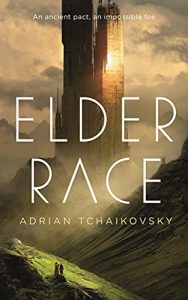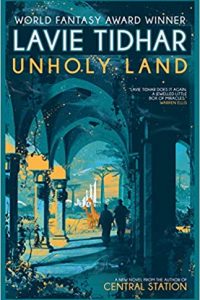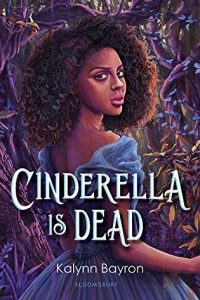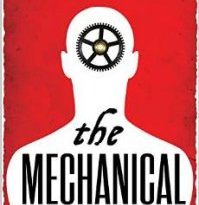Russell Letson Reviews Elder Race by Adrian Tchaikovsky
 Elder Race, Adrian Tchaikovsky (Tordotcom 978-1-250-76872-8, $14.99, 199 pp, tp) November 2021. Cover by Emmanuel Shu.
Elder Race, Adrian Tchaikovsky (Tordotcom 978-1-250-76872-8, $14.99, 199 pp, tp) November 2021. Cover by Emmanuel Shu.
Adrian Tchaikovsky’s Elder Race puckishly mixes ingredients from both science fiction and fantasy cookbooks. The usual science-fantasy recipe is a setting that presents as fantasy – medieval/feudal-ish societies with aristocrats, magicians, monsters, and warrior-heroes – but that finally explains the magic in material rather than supernatural terms (Arthur C. Clarke’s sufficiently advanced technology, etc.); or that presents a magical universe that nevertheless operates according to rules as intelligible as those of material science (see Walter Jon Williams’s Metropolitan or Michael Swanwick’s The Iron Dragon’s Daughter).
Tchaikovsky, however, is up to something a bit different in Elder Race. The first chapter gives us Lynesse Fourth Daughter, a plucky, scapegrace (and quite junior) princess and her doughty, smartmouth companion, Esha Free Mark, on a journey to a wizard’s tower to assert the terms of an “ancient compact.” The next chapter reveals that the wizard they call Nygroth Elder, “last of the ancients,” is actually Nyr Illim Tevitch, “anthropologist second class of Earth’s Explorer Corps,” left behind in suspended animation to mind the store after his colleagues returned to headquarters centuries earlier. The crucial variation of the familiar low-tech/high-tech science-fantasy scenario is that the story alternates between the viewpoints of Lynesse (third person) and Nyr (first person), and that it is only partly about Lynesse’s quest (yes, there’s a quest) to rid the world of a monstrous intruder.
The monster – Lynesse calls it a demon – is real enough, though Lyn has not managed to convince anyone at her mother’s court of the threat, and Nyr is skeptical as well, until they finally encounter the demonic infestation, nearly three-quarters of the way through the book. Up to that point, the conflicts are about roles and realities and mutual misunderstandings. I found it impossible to read this book without thinking of Tolkien. What if Gandalf were not an embodied angel but a second-class science bureaucrat anxious not to contaminate the societies he is studying? (If he looked a bit like Tim the Enchanter from Monty Python and the Holy Grail.) What if Frodo were a 16-year-old princess J.G. with a head full of heroic claptrap out of old stories – with, nevertheless, a better take on the need for heroism than the wizard’s? What if bridging the gap between world-views and expectations and accepted roles were almost as big a problem as finding and defeating a monster?
Nyr has a pretty good idea of the source of Lyn’s view of him, since his unauthorized extracurricular activities of a century earlier are one source of her heroic-romantic notions. But his problem isn’t as simple as explaining “germs or fusion power or anthropological theories of value” to Lyn and Esha; it’s with categories deeply embedded in their culture.
They think I’m a wizard…. And I literally do not have the language to tell them otherwise. I say “scientist,” “scholar,” but when I speak to them in their language, these are both cognates for “wizard.” I imagine myself saying… “I’m not a wizard; I’m a wizard, or at best a wizard.” It’s not funny.
Of course, to the local folk, everything about Nyr shouts “wizard,” from his appearance (seven feet tall, with horns), to his wardrobe’s personal-defense measures, to his ability to control monsters that are actually malfunctioning ancient construction machinery (his magic spells are the command codes).
Inside Nyr, though, it’s a different story, and the demon that Lyn is hunting isn’t the only one at large, though Nyr’s are psychological and metaphorical. He might be the product of an advanced technological civilization, loaded with physical and mental upgrades and powers, but he is also given to uncertainty and depression and kept psychologically afloat by one of those enhancements, his Dissociative Cognition System, which damps down emotional upsets and allows cool, rational analysis. But there is a price to pay when the DCS is turned off in order to clean up the physiological mess made by suppressing the somatic sides of fear, anxiety, stress, and grief. The more Nyr comes to understand Lyn’s desperate courage, the sadder he feels for her “trying to be something that never existed in the world, and failing because it’s impossible, and trying again.”
Despite the ironies and uncertainties and misapprehensions, the story follows through on its contract to deliver a there-and-back-again fantasy adventure, however ironized. The demon is a real and profound threat, the companions do confront it, and their battle exacts a price. At the same time, the book is a way of looking at fantasy – and of fantasy looking back at us. It’s about the power of story, even when the details are misunderstood or made up. And it’s another tale with a lot of heart.
This review and more like it in the January 2022 issue of Locus.
 While you are here, please take a moment to support Locus with a one-time or recurring donation. We rely on reader donations to keep the magazine and site going, and would like to keep the site paywall free, but WE NEED YOUR FINANCIAL SUPPORT to continue quality coverage of the science fiction and fantasy field.
While you are here, please take a moment to support Locus with a one-time or recurring donation. We rely on reader donations to keep the magazine and site going, and would like to keep the site paywall free, but WE NEED YOUR FINANCIAL SUPPORT to continue quality coverage of the science fiction and fantasy field.
©Locus Magazine. Copyrighted material may not be republished without permission of LSFF.







Oh, another one int he long waiting-to-read-after-retirement list!
I see quite a few parallels with Hard to be God by A. and B. Strugatsky from 1964. That story follows an earth “progressor” in a medieval-like world where his technology did look like magic. The novel was about freedom and had quite a few political messages – it came from the period in Easter Europe called the Warming.
Also, Inversions by I. M. Banks comes to mind. Also great stuff.
It would be interesting to see a review that places these three books, and possibly others, in context.